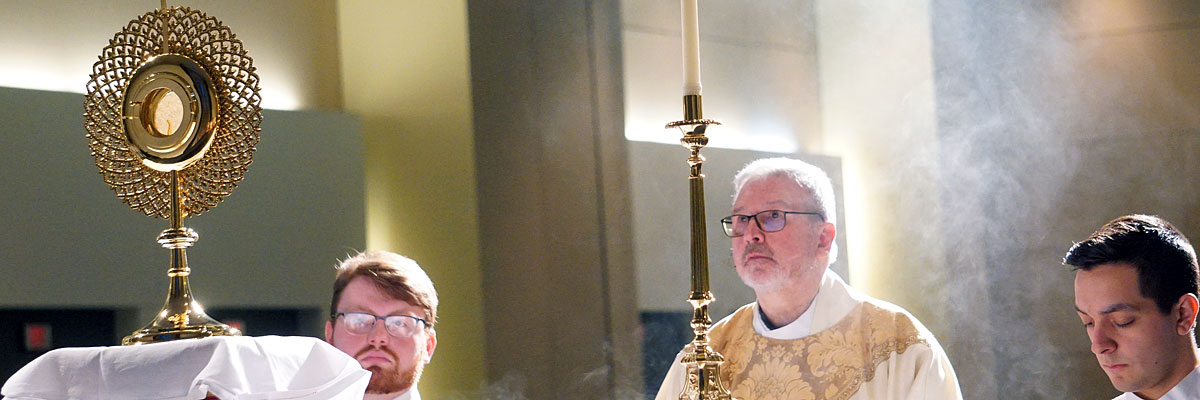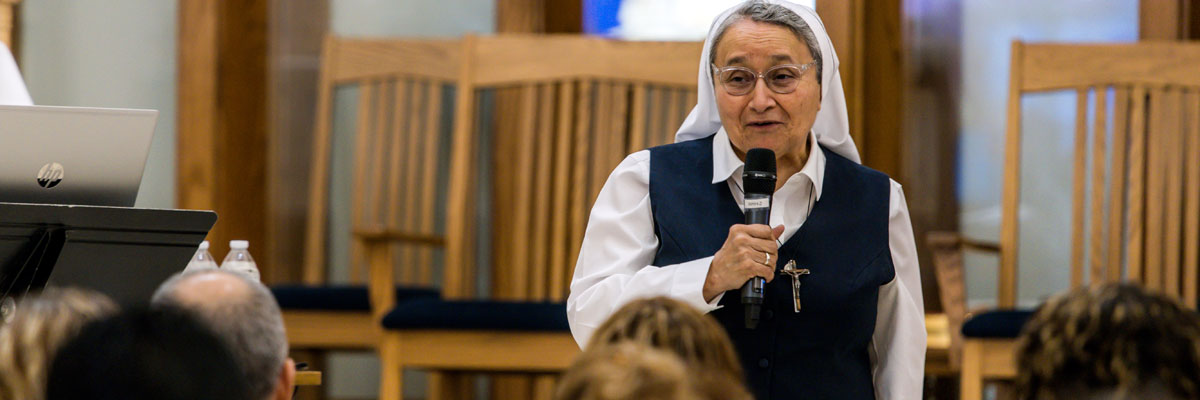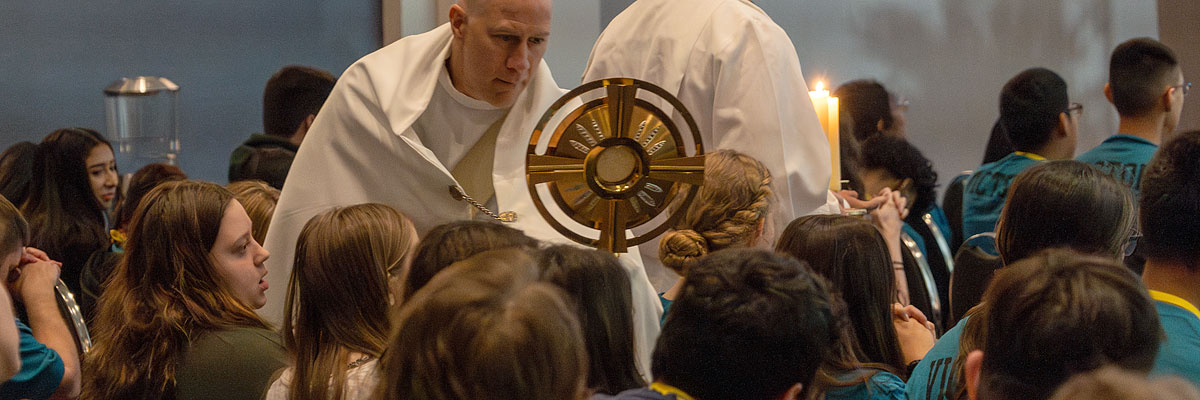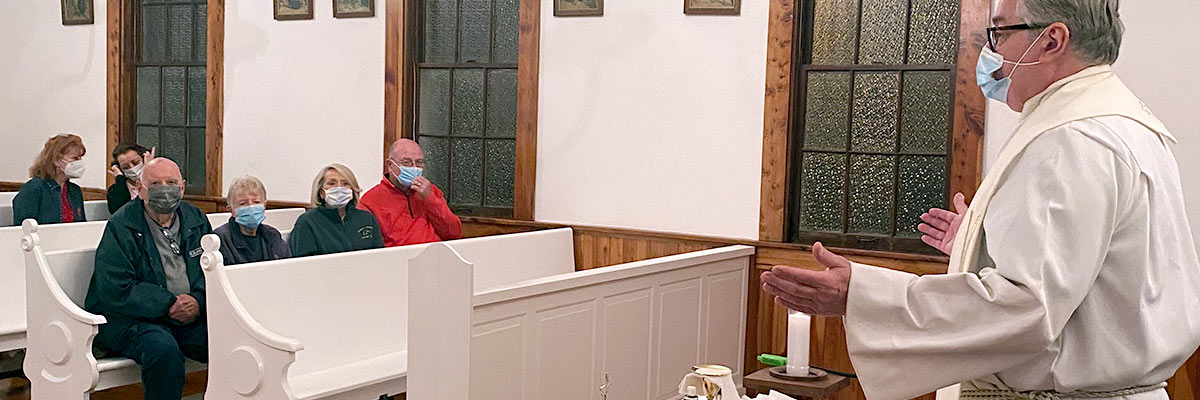Official Website of the
Catholic Diocese of Little Rock
Jesus taught with authority, great deeds
Published: August 14, 2010
This is the fifth column in a 13-part series
By Clifford M. Yeary
Associate Director, Little Rock Scripture Study
In true prophetic tradition, Jesus taught and revealed through actions as well as through words. Even where and how he taught was in itself an important sign of his authority and purpose. The Sermon on the Mount (Matthew 5-7) tells us much about Jesus even before we hear the first beatitude.
 “When he saw the crowds, he went up the mountain, and after he had sat down, his disciples came to him. He began to teach them …” (5:1-2a). Mountains, in biblical tradition, are the places for encounters with God, and in the Old Testament, the most important one of all is Sinai, where Moses receives the Ten Commandments. It is from Sinai, then, and through Moses, that Israel receives its foundational understanding of their covenant with God.
“When he saw the crowds, he went up the mountain, and after he had sat down, his disciples came to him. He began to teach them …” (5:1-2a). Mountains, in biblical tradition, are the places for encounters with God, and in the Old Testament, the most important one of all is Sinai, where Moses receives the Ten Commandments. It is from Sinai, then, and through Moses, that Israel receives its foundational understanding of their covenant with God.
Those in religious authority in Jesus’ time taught from a seated position (see Matthew 23:1-2). That Jesus goes up the mountain and sits to teach is a clear indication from Matthew that Jesus’ teaching is at least as authoritative for Israel as Moses’ teaching.
Not far into the Sermon on the Mount, we learn that Jesus is a teacher even greater than Moses. In Matthew 5:21-22 we read, “You have heard that it was said to your ancestors, ‘You shall not kill; and whoever kills will be liable to judgment.’ But I say to you, whoever is angry with his brother will be liable to judgment.”
The commandment against killing is one of the Ten Commandments Moses delivered to Israel. Jesus’ teaching assumes the authority to add to or even change the Law of Moses. Traditionally, the accounts of Jesus’ miracles have been regarded as demonstrations of Jesus’ divinity, but they also make a very loud and certain statement about the mysterious nature of what Jesus called “the kingdom of God” (usually referred to as the kingdom of heaven in Matthew). Many of us have grown accustomed to thinking of “heaven” as the kingdom of God, but biblically speaking, that kingdom is meant to be understood as a heavenly reality that seeks to make its home on earth.
In the Gospel of Mark we are introduced to Jesus’ ministry by way of the message Jesus proclaimed: “This is the time of fulfillment. The kingdom of God is at hand. Repent, and believe in the Gospel” (1:15). The Gospel, the Good News that Jesus preached, was that the reality of God’s reign over human affairs was at hand — it was so close you could almost touch it.
There were different expectations of what that meant in Jesus’ time. Many probably scoffed at the whole idea. Others would have been intensely awaiting a Messiah who would liberate Israel from its Roman oppressors. For those who associated the coming of the kingdom of God with “the day of the Lord,” it would have been regarded as a message of doom and gloom.
The prophet Amos’s warning is clear in that regard (5:18): “Woe to those who yearn for the day of the Lord! What will this day of the Lord mean for you? Darkness and not light!” John the Baptist was preparing Israel for what he called “the coming wrath (Luke 3:7).
What kind of message did Jesus send concerning the kingdom of God? It was a mixed message. Those who ignored his message were warned that its coming was indeed a judgment against them. “Woe to you, Chorazin! Woe to you, Bethsaida! For if the mighty deeds done in your midst had been done in Tyre and Sidon, they would long ago have repented in sackcloth and ashes” (Matthew 11:21). It is the deeds done in their midst that is the message they should have understood.
The key to Jesus’ message, however, is in the people’s experience of Jesus as the one who introduces them to the nearness (the reality in his person) of the kingdom of God. The kingdom of God comes to them in the experience of being healed and being forgiven. In the Sermon on the Mount, Jesus teaches that we must forgive those who offend us, we must love our enemies, we must be reconciled with each other. When we behave in that way, God’s will is being done on earth as it is in heaven. The kingdom of God is near.
In Jesus’ miracles, however, the sick, the hungry, the needy and the neglected of human society experience the society of God — citizenship in the kingdom of God. They are healed, forgiven, fed and welcomed back into fellowship with God's people.
Study Questions
- Why is Jesus’ posture important to the message of the Sermon on the Mount?
- What message do Jesus’ miracles convey about the kingdom of God?
- What events in your life have made you feel the nearness at hand of the kingdom of God?
- What are some actions your parish community can take to teach the nearness of the kingdom of God?
This article was originally published in Arkansas Catholic Aug. 14, 2010. Copyright Diocese of Little Rock. All rights reserved. This article may be copied or redistributed with acknowledgement and permission of the publisher.









